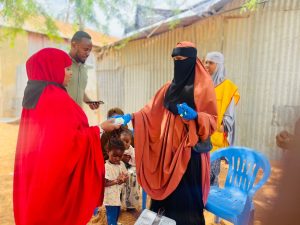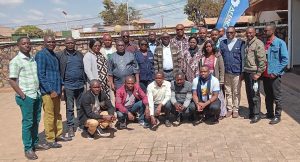Sustaining Efforts towards Maternal and Neonatal Tetanus Elimination in Ethiopia
-
by
AFENET

Ethiopia held a two-day national-level dissemination meeting to review the progress made in eliminating maternal and Neonatal Tetanus. This took place on 12th – 13th May 2023 at the Adama, Melka Adama Hotel.
During the meeting, presentations were made by different stakeholders on the recently concluded evaluation conducted in eight regions and two city administrations to assess the progress made so far on surveillance and reporting of tetanus, immunization coverage, and overall progress toward tetanus elimination. Within each selected region for evaluation, a tertiary hospital was selected based on reported NT and non-NT (inpatient) cases. The team also selected primary and general hospitals nearby that reported high numbers of tetanus cases. This also included health centers close to the tertiary hospital that reported high numbers of tetanus cases or cases with unusual epidemiology. The evaluation also included public health offices associated with the selected health facilities.
The evaluation design included; structured interviews, retrospective review of health facility registers, medical records abstraction, and comparison of surveillance data (national, regional, zonal, and woreda)
| Facilities visited |
Number |
|
|---|---|---|
| Public facilities |
Referral hospitals |
17 |
| General hospitals |
9 |
|
| Primary hospitals |
7 |
|
| Health centers |
10 |
|
| NGO hospital |
2 |
|
| Private hospital |
2 |
|
| Total |
47 |
|
Over the surveillance evaluation field implementation period from 5 November – 22 November 2019, the following have been recorded:
- 8 teams involved such as:
- 24 FETP residents
- 8 FETP coordinators/ resident advisors
- 6 universities
- 75 (63%) respondents reported their health facility had the capacity to admit a tetanus patient
- 78 (64%) of respondents reported having treated a tetanus patient ever
- 59 (49%) respondents reported having treated a tetanus patient in the last two years
- Neonatal Tetanus Reporting – Key Challenges:
- Lack of training on surveillance and high staff turnover (11)
- Limited awareness and knowledge among healthcare workers and surveillance staff (23)
- Lack of isolation room for case management (19)
- Weakness in the surveillance system (3)
- limited engagement from PHEM surveillance officers described
- Other challenges: dependent on measles and polio surveillance, limited interaction between clinicians and surveillance officers, delays to identify cases and unreported cases because of home deliveries
- The evaluation concluded that NT reporting is incomplete through IDSR and case based surveillance
- Lack of notification by clinicians to surveillance staff
- Insufficient register review by surveillance staff
- Lack of follow up/investigation of cases reported through IDSR by surveillance staff
- Low NT case reporting from high risk regions (likely home deliveries)
- NT risk factors matched known risk factors
- High number of non-NT cases, particularly among males highlighting an immunity gap in the population
- Recent wound important risk factor for non-NT cases
The stakeholders present during the meeting included;
- Departments from the Ethiopia Federal Ministry of Health (FMOH)
- Expanded Program for Immunization (tetanus FP and lead)
- Maternal Child Health
- Human Resources for Health Directorate / Field Epidemiology and Training Program (FETP)
- Policy, Planning, Monitoring, and Evaluation (PPMED) Directorate (house DHIS-2)
- Ethiopia Public Health Institute (EPHI) –
- Public Health Emergency Management Directorate (PHEM)
- Vaccine-Preventable Disease Surveillance Case Team
- Regional Public Health Emergency Management and EPI representatives
- Surveillance focal points, Clinicians, and Managers from selected tertiary hospitals
- African Field Epidemiology Network (AFENET)
- World Health Organization Maternal Neonatal Tetanus Elimination focal person (MNTE FP)
- Representative of WHO HQ
- UNICEF (MNTE FP)
- Ethiopian Pediatric Society
- CORE group (community-based surveillance)
- US Centers for Disease Control and Prevention- immunization focal point Ethiopia.
- Tetanus SMEs at CDC/GID Atlanta, VPD surveillance team at CDC/GID;



